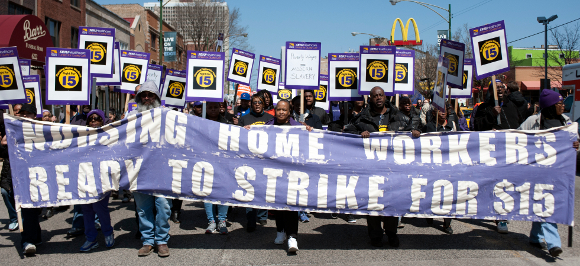Nursing Home Workers Take to the Streets to Fight for $15!


Round-Up of Nursing Home Workers Fighting for $15! (April 14th, 2016)
(April 14th, 2014) — Nursing home workers took to our Fight for $15 to the streets as part of the April 14th national day of actions across the country. Nursing home workers started the series of actions on April 13th by holding a prayer vigil and marched down Sheridan Road on the Northside of Chicago, across from several nursing facilities.
Then the following day on April 14th nursing home workers joined with home care, child care, striking fast-food workers and adjunct professors to stage a major rally at Loyola University and then marched to Lake Shore Drive where workers blocked traffic for several minutes.
“On behalf of our nursing home workforce I can definitely say that we are overworked, underpaid, and unappreciated. That’s why all low-wage workers see our Fight for $15 as essential and non-negotiable,” said Lakesia Collins, a low-wage CNA at Symphony at Midway Nursing Home who works in the Dementia Unit. “Working people share one struggle – and it’s a fight for basic fairness and economic justice. The number one driver of poor educational outcomes and poor health is poverty. We’re fighting for $15 for our families and our communities,” said Lakesia Collins, who is a key spokesperson for the nursing home Fight for $15 campaign.
Nursing home workers highlighted key findings a new major report from the Paraprofessional Healthcare Institute (PHI) that called on the nursing home industry to pay workers $15 an hour to retain and strengthen its low-wage workforce since over 50% turns over annually.
- More than 50% of the nursing home workforce turns over every year – but it is becoming increasingly difficult to fill vacant positions.
- The nursing home workforce is almost entirely female (91%) and the majority (53%) are African-American, Latino or other racial / ethnic minorities.
- Nursing assistants earn a median hourly wage of $11.51; meaning half of the workforce literally earns less than this hourly wage.
- One in three nursing assistants relies on public assistance to supplement their earnings to help support their family.
- The “real wages”, adjusted for inflation, have DECREASED by 7% over the last decade.
- Over 3 million older adults and people living with disabilities reside in nursing homes today. And over the next three decades, this population will grow from 6.3 million to 18 million.
